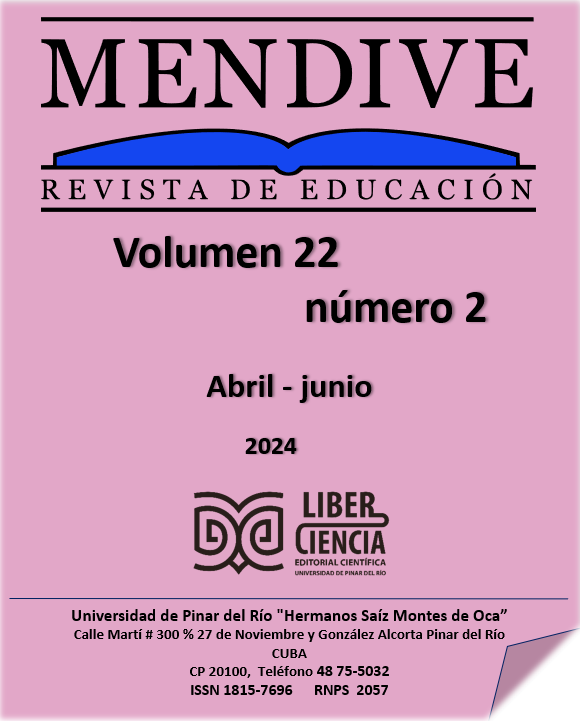Active strategies and pedagogical currents in teacher training
Main Article Content
Abstract
In the reality of current teacher training, the application of strategies that promote active learning is a necessity for the preparation of educators. Precisely, the objective of this work was to assess some of the strategies in the study of pedagogical currents with an active focus on teacher training. This forced us to think creatively about the methods and techniques of current teaching, which caused a true revolution in teaching strategies to achieve the planned objectives. From an eminently qualitative conception in the elaboration of this work, documentary research methods were used, which allow the approach to various bibliographic sources on pedagogical currents, teaching strategies and their application in various contexts. Likewise, analysis and synthesis were applied in an intentional selection of sources within the wide production of texts on innovative pedagogical trends, as well as induction and deduction in professional training. Participant observation, interviews with key informants, application of questionnaires and methods associated with working with the results of the teaching activity were also used. The applied methodology combined a variety of active strategies and resources. The results show that the educational activities from the subject related to the pedagogical currents are beneficial in the cultural formation of educators. It has been shown that the application of educational strategies with an active approach favors the significant learning of the pedagogical currents in the educational present of the teachers in training.
Downloads
Article Details

This work is licensed under a Creative Commons Attribution-NonCommercial 4.0 International License.
References
Álvarez-Álvarez, C. & Pascual-Díez, J. (2019). Estrategias didácticas en torno a la lectura empleadas en la formación inicial del profesorado en España. Ocnos: Revista de Estudios Sobre Lectura, 18(3), pp. 38-47. https://doi.org/10.18239/ocnos_2019.18.3.2108 ; https://cesco.revista.uclm.es/index.php/ocnos/article/view/ocnos_2019.18.3.2108
Bacon, F. (2002). Novum organum. Ediciones Folio. ISBN 84-413-1856-5.
Barrera, M. M. (2024). Aportes de la ciencia cognitiva a la comprensión de la cognición. Entretextos, 18(34), 316-324. http://revistas.uniguajira.edu.co/rev/index.php/entre/article/view/e10472717
Benítez-Vargas, B. (2023). El Constructivismo. Con-Ciencia Boletín Científico de la Escuela Preparatoria No. 3, 10(19), 65-66. https://repository.uaeh.edu.mx/revistas/index.php/prepa3/article/view/10453
Briceño Toledo, M.; Correa Castillo, S.; Valdés Montesinos, M.; Hadweh Briceño, M. (2020). Modelo de gestión educativa para programas en modalidad virtual de aprendizaje. Arturo Prat University, 26(2), 286-298
Calvas Ojeda, M. G., Espinoza Freire, E. & Herrera Martínez, L. (2019). Fundamentos del estudio de la Historia Local en las Ciencias Sociales y su importancia para la Educación Ciudadana. Conrado, 15(70), pp.193-202. http://scielo.sld.cu/scielo.php?script=sci_arttext&pid=S1990-86442019000500193&lng=es&tlng=es
Casasola Rivera, W. (2020). El papel de la didáctica en los procesos de enseñanza y aprendizaje universitarios. Comunicación, 29(1), pp. 38-51. https://dx.doi.org/10.18845/rc.v29i1-2020.5258; https://www.scielo.sa.cr/scielo.php?pid=S1659-38202020000100038&script=sci_arttext&tlng=pt
Comenio, J.A. (2004). Didáctica Magna. Editorial: Porrúa. https://www.pensamientopenal.com.ar/system/files/2014/12/doctrina38864.pdf
Dewey, J (1975). Democracia y educación. Ediciones Morata. ISBN 9788471123916
Espinel-Bernal, O. O. (2024). Pedagogía, educación e investigación: campo en disputa, campo de constitución. Pedagogía y Saberes, (60). https://revistas.pedagogica.edu.co/index.php/PYS/article/view/17609
Fernández González, N., & Prieto Egido, M. (2023). La educación y lo público en la Pedagogía liberal y en la Pedagogía crítica. Teoría de la educación: revista interuniversitaria, 35(2), 81-97. https://redined.educacion.gob.es/xmlui/handle/11162/251415
Fernández Martín, E. (2020). Análisis de estrategias metodológicas docentes innovadoras apoyadas en el uso de TIC para fomentar el Aprendizaje Cooperativo del alumnado universitario del Grado de Pedagogía. Revista interuniversitaria de formación del profesorado, 34(95) ISSN 0213-8646, ISSN-e 2530-3791, pp. 79-100. https://dialnet.unirioja.es/servlet/articulo?codigo=7537497
Freire, P. (2022) Pedagogía del oprimido. Nueva York: Herder y Herder,/México: Siglo XXI Editores, 3a ed., 243 p.
González Fernández, M. & Huerta Gaytán, P. (2019). Experiencia del aula invertida para promover estudiantes prosumidores del nivel superior. RIED. Revista Iberoamericana de Educación a Distancia, 22(2), pp. 245-263. doi: https://doi.org/10.5944/ried.22.2.23065
Locke, J. (2020). Ensayo sobre el entendimiento humano. Editorial Verbum.
López, M. (2019). La pedagogía crítica como propuesta innovadora para el aprendizaje significativo en la educación básica. ReHuSo: Revista de Ciencias Humanísticas y Sociales, 4(1), 87-98. Pontificia Universidad Católica del Ecuador
Mateus, J. C., Sola, P. A., Cabrera, C. D. R. G., Ugalde, C., & Novominsky, S. (2022). Perspectivas docentes para una agenda crítica en educación mediática post COVID-19.: Estudio comparativo en Latinoamérica. Comunicar: Revista Científica de Comunicación y Educación, (70), 9-19. https://dialnet.unirioja.es/servlet/articulo?codigo=8198765
Montessori, M. (2023). La mente del bambino. Rizzoli.
Navarro, J. A., & Navarro-Montaño, M. J. (2023). Retos y desafíos para la formación docente en clave de inclusión. Alteridad, 18(2), 248-263. https://alteridad.ups.edu.ec/index.php/alteridad/article/view/6595
Pérez-Pérez, S. (2024). Nuevas TIC, nuevas pedagogías y nuevas metodologías de aprendizaje. Orvium Education. https://doi.org/10.13140/RG.2.2.30546.79048
Piaget, J. (2015). Psicología del niño. Ediciones Morata.
Rodríguez, J. B., & Ries, F. (2023). Intervenciones de la Escuela Activa: revisión de posibles propuestas. Revista Española de Educación Física y Deportes, 437(2), 1-13. https://reefd.es/index.php/reefd/article/view/1091
Rousseau, J. J. (2023). Emílio ou sobre a educação. Editora Vozes.
Serna, L. I. P. (2024). La didáctica universitaria en los procesos investigativos. EVSOS, 2(3), 53-65. https://revistaevsos.com/index.php/evsos/article/view/113
Vygotsky, Lev S (1978), Pensamiento y lenguaje, Madrid: Paidós.


